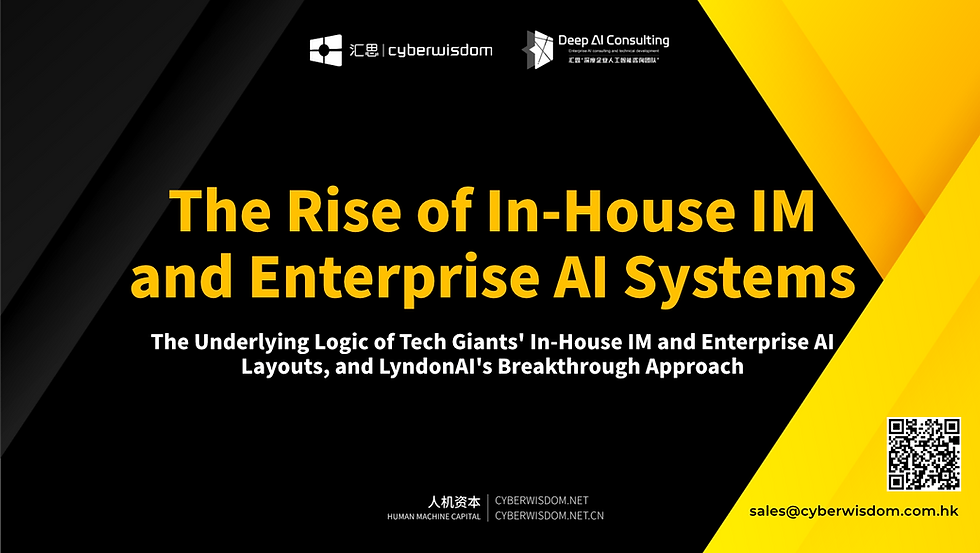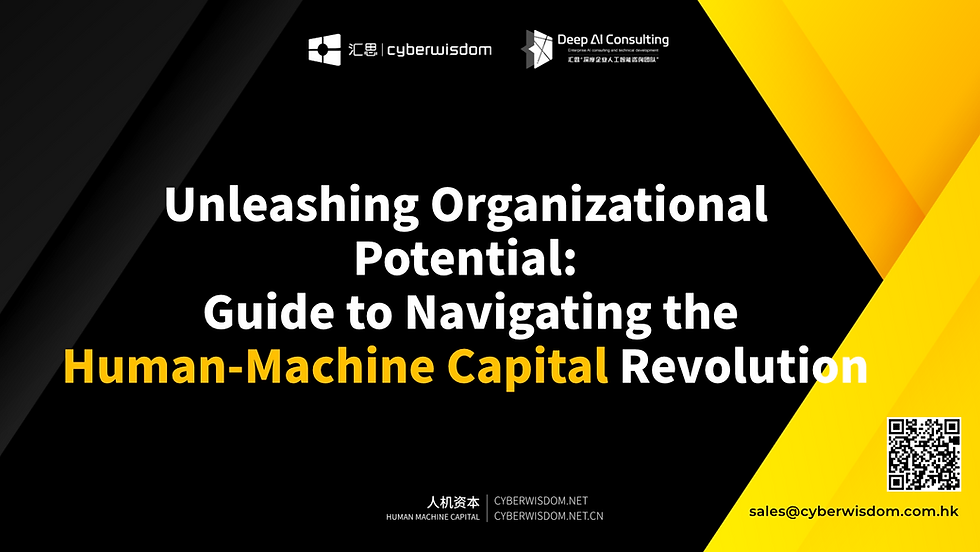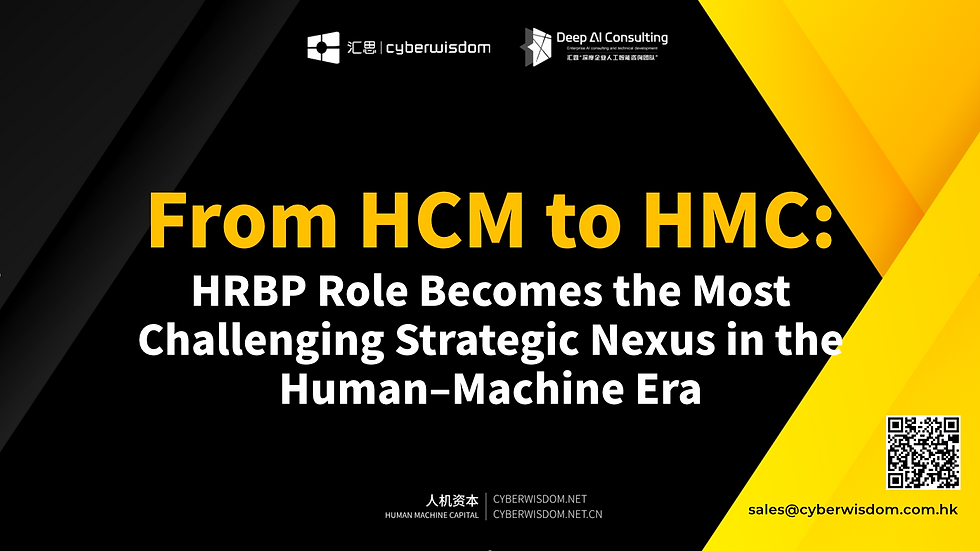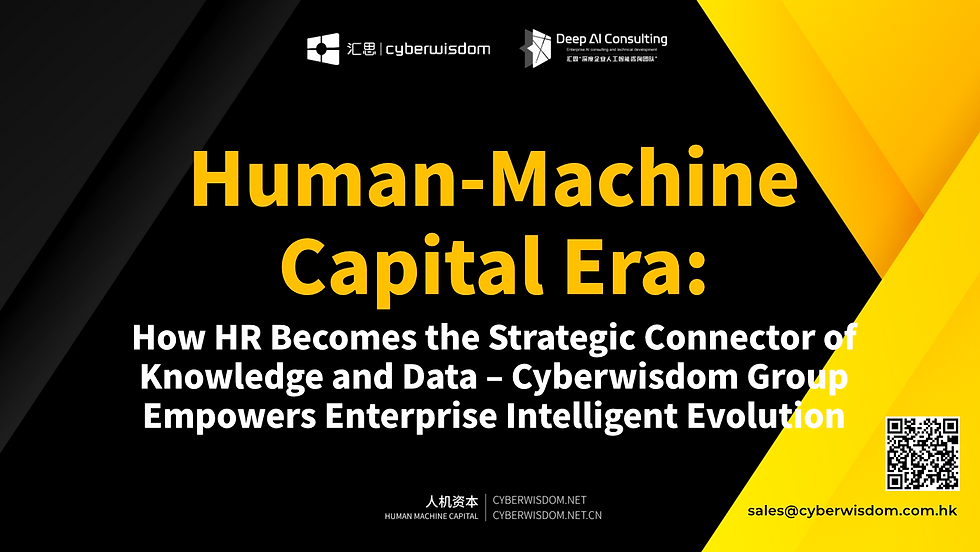The Rise of In-House IM and Enterprise AI Systems
- Judy

- 4 days ago
- 5 min read

In today's digital era, the way enterprises communicate and manage operations is undergoing profound transformation. Recently, Xiaohongshu (Little Red Book) announced plans to migrate from WeCom (WeChat Work) to its self-developed collaboration system, Red City, around mid-August—a move that has drawn widespread attention. In fact, beyond Xiaohongshu, tech giants such as ByteDance and JD.com are also shifting toward in-house instant messaging (IM) platforms, reflecting deeper strategic considerations.
Why Tech Giants Prefer In-House IM
Data Security and Privacy Protection
For large enterprises, data is a core asset, making its security and privacy of utmost importance. Although third-party IM tools like DingTalk and WeCom claim strong security features, major companies still worry about potential data leaks. For example, WeChat, as a widely used social platform, offers convenient information sharing due to its open ecosystem. However, once a leak occurs, it spreads rapidly and is difficult to trace back. With an in-house IM system, enterprises gain greater control over data storage and transmission. They can implement tailored encryption strategies and access control mechanisms, ensuring robust data protection from the ground up.
Customization and Business Alignment
Large companies operate at scale and complexity, often requiring unique workflows and communication needs. While general IM tools offer rich features, they may not fully meet these specialized demands. Take ByteDance as an example: its business spans multiple domains, necessitating an IM system that can seamlessly integrate with internal systems such as CRM and ERP to enable rapid information flow and efficient collaboration. An in-house IM system allows for tailored development that aligns precisely with business processes, thereby enhancing productivity.
Performance Optimization and Stability Assurance
Tech giants typically serve millions of employees and users, generating massive data traffic. This places extreme demands on the performance and stability of IM systems. General IM platforms may encounter performance bottlenecks—such as message delays or system lag—when handling high concurrency and large data volumes. Custom-built IM systems can be optimized specifically for enterprise scale and requirements, leveraging advanced architecture and algorithms to ensure stable, high-performance operation even under heavy load, delivering a smoother communication experience.
Reducing Dependency Risks
Relying on third-party IM services exposes companies to risks such as service interruptions and feature changes. Should a third-party provider experience issues like server outages or policy changes, it could severely disrupt business operations. Developing an in-house IM system reduces dependency on external vendors, allowing companies to maintain full control over their communication tools and workflows, and minimizing the risk of operational disruption.
Why Enterprises Are Investing in In-House AI Systems
Data Security and Compliance Needs
As data becomes increasingly critical, so too do concerns around security and compliance. Enterprises in sectors such as finance and healthcare must meet stringent regulatory standards like GDPR and China’s Level-3 Protection Scheme, ensuring data sovereignty and secure storage. Private deployment of in-house AI systems enables enterprises to store all data on-premise, avoiding the risks associated with public API transmissions. Companies can also implement their own encryption protocols and access control policies, effectively mitigating various security threats.
Customization and Vertical Scenario Adaptation
Different industries and businesses have unique operational needs and application scenarios. Generic AI models often fall short in addressing these specific demands. In-house AI systems can be tailored and trained using enterprise-specific data and domain knowledge, enabling more precise model optimization and functional expansion. For example, in the healthcare industry, AI diagnostic assistance can be enhanced using patient data, while financial institutions can improve prediction accuracy using risk-control data—both achieving better alignment with vertical application scenarios.
Performance and Cost Efficiency
In high-frequency, real-time scenarios such as production monitoring and high-frequency trading, deploying in-house AI systems locally can significantly reduce network latency and improve response speed. Although initial investment in hardware and R&D may be required, over the long term, companies that frequently use AI services can avoid recurring third-party API costs, leading to lower overall operational expenses.
Technical Autonomy and Competitive Advantage
Having an in-house AI system enables enterprises to control core technologies, enhancing their competitive edge. Through continuous innovation and optimization, companies can develop differentiated products and services, building a unique competitive moat. For instance, a legal tech company developed a contract review AI based on its proprietary AI model, significantly improving review efficiency and accuracy, thereby increasing customer retention rates.
LyndonAI: A Pioneering Enterprise AI System
LyndonAI, as an enterprise-grade AI management platform, provides comprehensive AI solutions—offering compelling reasons for enterprises to adopt it.
LyndonAI integrates four core systems: VibeChat (Intelligent Social Chat Platform), Fusion (Intelligent Search Platform), Optima (Enterprise AI Bot), and Kora (Enterprise AI Knowledge Management System). VibeChat enhances team communication efficiency through AI, enabling human-machine resonance and knowledge accumulation. Fusion breaks down data silos through strong contextual understanding and dynamic feedback, enabling human-machine collaborative knowledge exploration. Optima focuses on productivity optimization, automating workflows and supporting human-machine collaboration. Kora enables networked human-machine knowledge connections and hierarchical data coordination, effectively managing and utilizing enterprise knowledge assets.
In addition, LyndonAI features the TRISM Enhancement Framework and Full Lifecycle Management Module. The TRISM framework, built on AI Trust, Risk, and Security Management principles, ensures higher compliance, output reliability, and fairness in AI applications, comprehensively reducing AI-related risks. The full lifecycle module covers AI from design, development, and deployment to operations, iteration, and retirement, standardizing and regulating the entire AI system lifecycle.
Conclusion
The trend of tech giants developing in-house IM systems and enterprises building proprietary AI platforms reflects strategic considerations around data security, business customization, and performance optimization. As an advanced enterprise AI management platform, LyndonAI offers efficient, secure, and customizable AI solutions that empower enterprises to achieve better human-machine collaboration and enhance competitiveness during digital transformation. As technology continues to evolve, more companies will embrace in-house IM and AI systems, propelling enterprise digitalization to new heights.
Cyberwisdom Group
Cyberwisdom Group is a global leader in Enterprise Artificial Intelligence, Digital Learning Solutions, and Continuing Professional Development (CPD) management, supported by a team of over 300 professionals worldwide. Our integrated ecosystem of platforms, content, technologies, and methodologies delivers cutting-edge solutions, including:
wizBank: An award-winning Learning Management System (LMS)
LyndonAI: Enterprise Knowledge and AI-driven management platform
Bespoke e-Learning Courseware: Tailored digital learning experiences
Digital Workforce Solutions: Business process outsourcing and optimization
Origin Big Data: Enterprise Data engineering
Trusted by over 1,000 enterprise clients and CPD authorities globally, our solutions empower more than 10 million users with intelligent learning and knowledge management.
In 2022, Cyberwisdom expanded its capabilities with the establishment of Deep Enterprise AI Application Designand strategic investment in Origin Big Data Corporation, strengthening our data engineering and AI development expertise. Our AI consulting team helps organizations harness the power of analytics, automation, and artificial intelligence to unlock actionable insights, streamline processes, and redefine business workflows.
We partner with enterprises to demystify AI, assess risks and opportunities, and develop scalable strategies that integrate intelligent automation—transforming operations and driving innovation in the digital age.
Vision of Cyberwisdom
"Infinite Possibilities for Human-Machine Capital"
We are committed to advancing Corporate AI, Human & AI Development, enabling enterprises to thrive in an era of intelligent transformation.



Commentaires